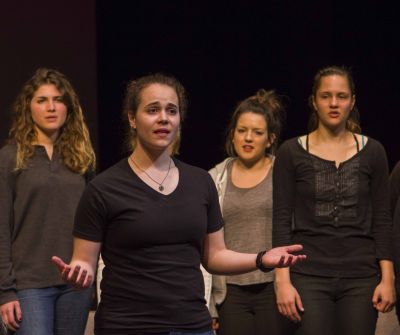Goshen College women to share stories at second Goshen Monologues

Event: Documentary premiere: “Goshen Monologues: The Storytellers”
Date and time: April 12, 4:30 p.m.
Location: Goshen College Umble Center
Performance: Goshen Monologues performance
Date and time: April 14, 8 p.m. Doors open at 7:30 p.m.
Location: Goshen College Church-Chapel
Goshen College faculty, staff and student women will perform stories about friendship, sexuality, body image, trauma and triumph in the second annual Goshen Monologues on Tuesday, April 14. The performance will take place at 8 p.m. in the Goshen College Church-Chapel and is free and open to the public.
Additionally, on Sunday, April 12, a documentary about the making of last year’s Goshen Monologues will premiere at 4:30 p.m. in the Umble Center. Directed and edited by communication students Abby Deaton, a senior from Indianapolis, and Elizabeth Derstine, a junior from Lancaster, Pennsylvania, the film documents the journey of the 35 women who came together in 2014 to share true stories from women of Goshen College. In the film, performers share their own stories of pain, hope and strength while preparing to become the first storytellers of Goshen Monologues. The premiere is free and open to the public.
“I wanted people to get an idea of what it was like to be a part of the cast and to enter that holy rehearsal space with these women,” said Deaton. “Understanding how the cast of the women connected to each other and to the writers helps the audience get a deeper understanding of what Goshen Monologues is really about.”
Similar to last year’s performance, the 2015 Goshen Monologues will feature true stories of womanhood in various forms – as poetry, fiction or letters to younger selves. Student organizers collected the anonymous stories from Goshen College women last fall and turned them into a script this spring.
This year, 65 women will perform 54 stories organized into several chapters, including Body, Relationships, Self-Love, Sexual Assault, Sexuality and Womanhood. The stories have themes of celebration, reclamation of body and self, joy, shame, guilt, pain and grief.
Utilizing both group performance and individual monologues, the performance will address not only the darker realities that society imposes upon the female gender, but also celebrate the joyful and encouraging moments of womanhood.
The purpose of the monologues is to make peace through stories, said Anna van der Zwaag, a senior molecular biology/biochemistry major from Worthington, Ohio and a member of the monologue steering committee. van der Zwaag believes that each story in the program is unique but also speaks to some universal nature of how women encounter the world.
“The women who wrote these stories are placing themselves in one of the most vulnerable positions any woman can be placed in,” said van der Zwaag. “And in turn, they are putting all of our universal truths on paper and trusting another woman, perhaps a best friend or maybe a stranger, to express this truth.”
Full credit for the stories belongs to the women who wrote them, not the women who perform them, said van der Zwaag. “This is different than acting – each monologue is not a character that needs to assumed. The performers are the medium through which the words can be expressed. They are a canvas.”
For this reason, performers will wear gray for the performance and leave the stage immediately following the last monologue rather than taking a bow.
Ultimately, says van der Zwaag, Goshen Monologues is about stories and the women those stories represent.
“Just as these stories tell the truths of our lives and of the lives of women in our community, they also tell stories of women around the world [and across time],” said van der Zwaag. “They tell the stories of our mothers and grandmothers, just as they might tell the stories of our daughters and granddaughters. We tell these stories to preserve this sacred bond between generations and cultures.”
For Derstine and Deaton, who each spent over 100 hours editing the Goshen Monologues documentary, creating the film has helped them process and internalize what these stories mean, and they hope the film will do the same for others.
“No matter how many times I watch the footage, the interviews and performances, there are scenes and quotes that give me goosebumps,” said Derstine. “The power that these women had is a lasting one.”
– By Ariel Ropp




